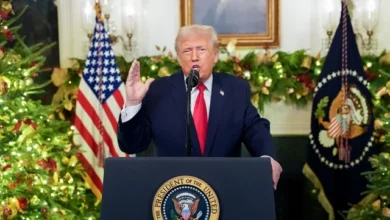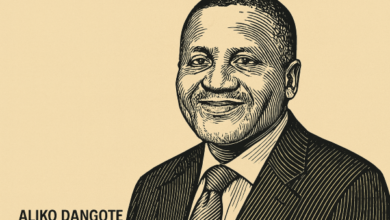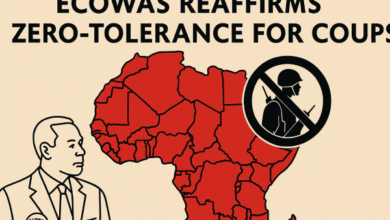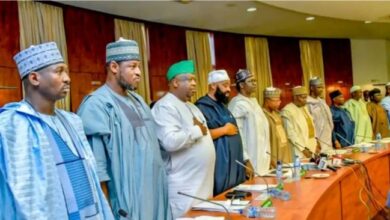Tinubu says mass defection of Delta PDP, Oborevwori, Okowa to APC is ‘Tsunami of Historic Proportions’
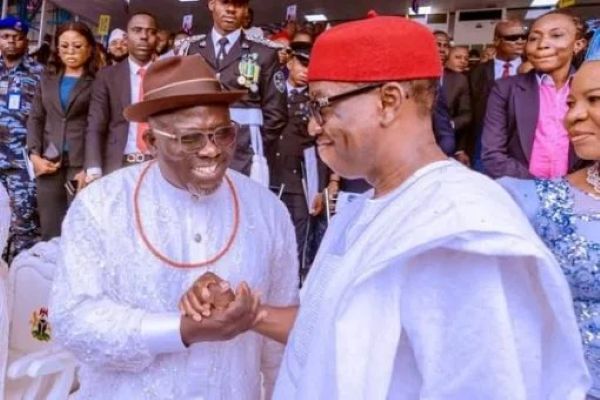
By BRANDECONOMY Political Desk
In what is being described as one of the most significant political realignments in recent Nigerian history, Delta State Governor Sheriff Oborevwori, former Governor Ifeanyi Okowa, and the entire leadership structure of the Delta State People’s Democratic Party (PDP) have staged an official defection to the All Progressives Congress (APC).
At a grand ceremony held in Asaba on Monday, President Bola Ahmed Tinubu, represented by Vice President Kashim Shettima, likened the mass movement to a “political tsunami,” underscoring its profound implications not just for Delta State but for the broader dynamics of Nigerian politics.
A Political Realignment of Rare Scale
The scale of the defection is staggering: it involves the sitting governor, his cabinet, 25 local government chairmen, over 500 councillors, members of the State House of Assembly, and all National Assembly representatives from Delta under the former PDP banner.
“This is a political tsunami of unimaginable proportions,” Tinubu declared. “No greater testimony can be given to the strength of our party than what we are witnessing today.”
Beyond the theatrics, the mass defection signals a strategic shift that could fundamentally alter political power calculations ahead of the 2027 general elections, particularly in the South-South — traditionally a stronghold of the PDP.
Reading Between the Lines: Why Now?
BRANDECONOMY analysis suggests several factors behind the dramatic switch:
- Access to Federal Power: Delta leaders, led by Oborevwori and Okowa, appear to have pragmatically concluded that remaining in opposition limits the state’s ability to access federal resources and projects.
- Survival and Relevance: As political tides turn nationally, leaders are repositioning to remain influential within Nigeria’s patronage-driven political system.
- Internal Fractures within PDP: Persistent internal divisions, leadership crises, and a weakening national structure may have accelerated the exodus.
Governor Oborevwori himself captured the sentiment in his address: “This is not just a defection, but a movement. Remaining in opposition has never truly benefited Delta State.”
Former Governor Okowa, long seen as a pillar of the PDP, endorsed the decision, describing it as a “collective move to a better platform”.
APC’s Expanding Footprint — But at What Cost?
For President Tinubu and the APC, the Delta defection is a significant trophy, signaling that the ruling party remains a magnet for political actors seeking proximity to federal power. APC National Chairman, Dr. Abdullahi Ganduje, triumphantly handed over the party’s flag to Oborevwori, promising “full support from the presidency and progressive governors.”
However, BRANDECONOMY political analysts warn that mass defections, while beneficial in the short term, could introduce ideological contradictions and internal tensions within APC ranks — especially as former PDP actors seek to assert influence within their new party home.
The party must now navigate the delicate task of integrating former rivals without alienating its longstanding loyalists.
South-South Dynamics: New Battle Lines Drawn
Historically, the South-South has been a PDP stronghold. The loss of Delta — one of the region’s economic heavyweights, buoyed by oil wealth — could weaken PDP’s hold and embolden APC ambitions to consolidate power in neighboring states like Rivers, Bayelsa, and Akwa Ibom.
Governor Hope Uzodinma of Imo State, speaking at the event, acknowledged the strategic nature of the move: “Delta State has made the right decision by aligning with the government at the center for deeper development.”
The symbolism is potent: with Oborevwori becoming the 22nd APC governor nationwide, the ruling party’s dominance has been visibly reinforced.
The Road Ahead: Risks and Opportunities
While the momentum clearly favors the APC, challenges loom:
- Managing Ambitions: The integration of powerful political actors like Okowa and Oborevwori could trigger leadership struggles within APC Delta.
- Delivering on Promises: Voters will expect tangible dividends from this realignment. Failure to deliver could breed disillusionment and instability.
- Reviving the PDP: The PDP faces a moment of existential reckoning. If the party cannot recalibrate swiftly, it risks further hemorrhaging support across the South-South.
Finally…
As the dust settles, one thing is clear: Nigerian politics has entered a new phase where ideological loyalties are increasingly fluid, and access to power remains the ultimate prize.
The “Delta tsunami” will ripple far beyond Asaba, shaping alliances, ambitions, and the architecture of power as the country inches towards 2027.









